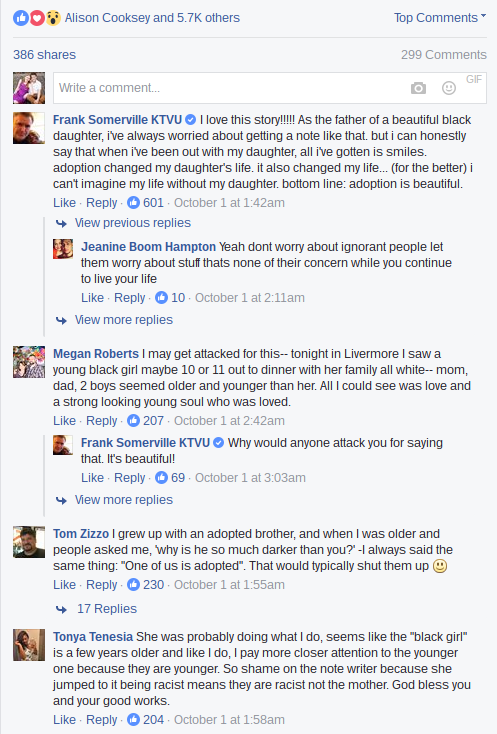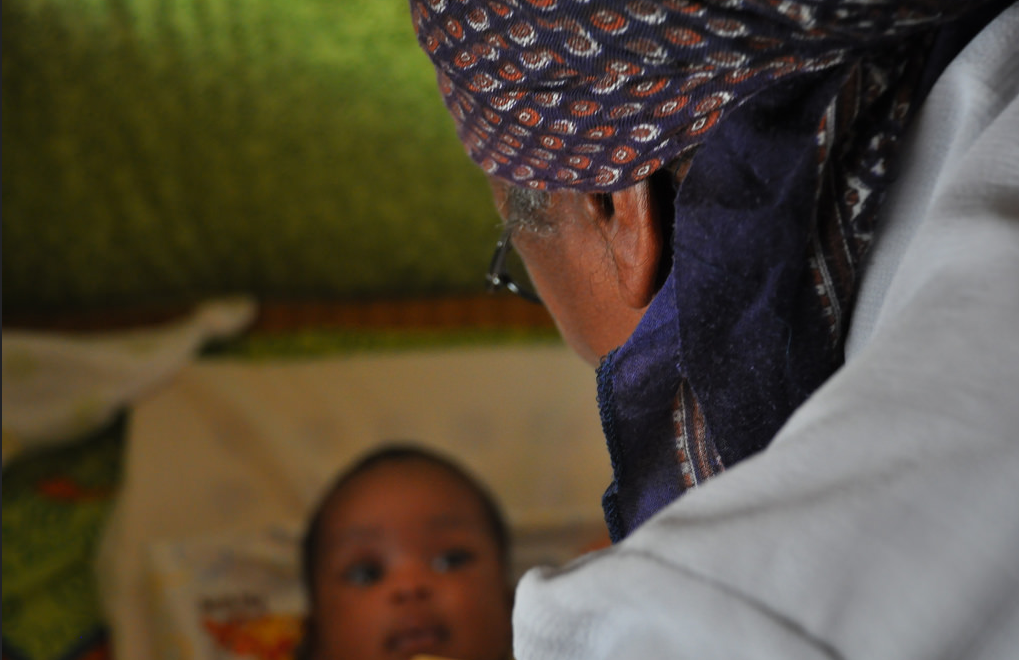Read This Woman's Letter About What Other People See When They Look at Her Interracial Family

By:
Nearly 40-percent of adopted children in the United States are taken in by families with different racial identities. But despite how common interracial adoptive families are, a Facebook post by a Florida mother proves that negative assumptions about them still persist.
Tonya Keefer opened her Facebook post by mentioning that someone left an angry anonymous note on her car windshield while she and her family ate at a restaurant. The note writer alleged that Keefer, who is white, demonstrated favoritism toward her younger child versus her black adopted daughter in the parking lot, saying Keefer and her husband "walked off and did not look back for the little black girl to make sure she got out the car safely."
"You should be ashamed," the note reads. "Seems like you’re racist. Give the black girl back to her mother. You and your husband are white trash."
In a post including photos of the note, Keefer wrote that even though the words should have made her "angry," it just saddened her because of the lens stranger used to view her family:
"I pity the person who sees my family and can only see the colors of our skin because in our home we make no such distinction. In our home we choose not to define or be defined because of a color. The 'black girl' as you call her, is so much more than the label you place on her. She has a name, we call her Leah. She has a beautiful personality, a silliness that is endearing and a laugh that is infectious. She is talented and creative and hilarious. In fact as we drove into the zaxbys parking lot tonight she was bouncing and giggling in the back seat, being her incredibly unique self."
Keefer's post garnered widespread attention when it was shared on news anchor Frank Somerville's Facebook page.
Somerville, who recently opened up about his own experience as an adoptive father to a black daughter, shared Keefer's post over the weekend:
 Facebook - facebook.com
Facebook - facebook.com
The insinuation is that Keefer is neglectful of the adopted child because she is black. Some people may be suspicious of white parents with black children because they are unsure that the adoptive parents can meet the child's specific needs, or properly introduce the child to his/her cultural background. For example, Curtis Rogers, the adopted father of a black son, wrote in a 2013 piece for Chicago Now that he faced this suspicion firsthand when an older black woman doubted that he could groom his son's hair.
The woman also asked him what made him think he was qualified to have a black child, forcing Rogers to recognize the "racial and social implications that never, ever entered [his family's mind] when [they] decided that race didn’t matter when it came to adopting."
"Input from the African American community matters to my family, because my son is African American, and at some point, he will have to find his place in the world and his cultural community," Rogers wrote. "I wasn’t sure how to help him do that. Maybe, just maybe, the African Americans who voiced concern about our adoption were as concerned about how this baby would find his way as we were."
 Flickr/Terence Nance - flickr.com
Flickr/Terence Nance - flickr.com
Some white parents have also been questioned for the sincerity of their decision to adopt children of other races. Christian writer Rachel Garlinghouse, a white mother of two adopted black children, wrote in a 2011 blog post for MyBrownBaby.com that she understands why the black community would wonder about a white person's motivations for adopting a child of color, given America's history of racial division.
But regardless of what others think about her own reasons for adopting black children, Garlinghouse wrote that her motivation was only to be a mother:
"My girls are 'my own' despite the questions we are often asked or the stares we encounter. Our motivation to adopt and to accept a child of any race is, despite the complexity of race and adoption in America, quite simple: I wanted to be a mother to the child God had for us."
Growing up with parents of a different race or background can make it harder for some adopted children to fully understand their roots. Author Chad Goller-Sojourner noted this in a 2015 interview with The Root:
"One of the interesting things from when I was younger is when you grow up with white parents, white neighborhood, white church, your default identity is a white kid. Blackness comes later. People always reminded me I was black.”
The American Adoptions agency website has a detailed set of recommendations for people looking to adopt children of different races or backgrounds, noting the importance of teaching the adopted child about his or her cultural background:
"Families considering transracial adoption should also note that adopting a child of a different race also comes with its own set of unique considerations. They should be prepared to teach their adopted child about their ethnicity and should foster a home environment that is open and loving of all races and cultures. As the child grows, adoptive parents should be prepared to answer questions their child may have about their own ethnic and cultural identity."
Read Keefer's full post below:
[H/T PopSugar]
